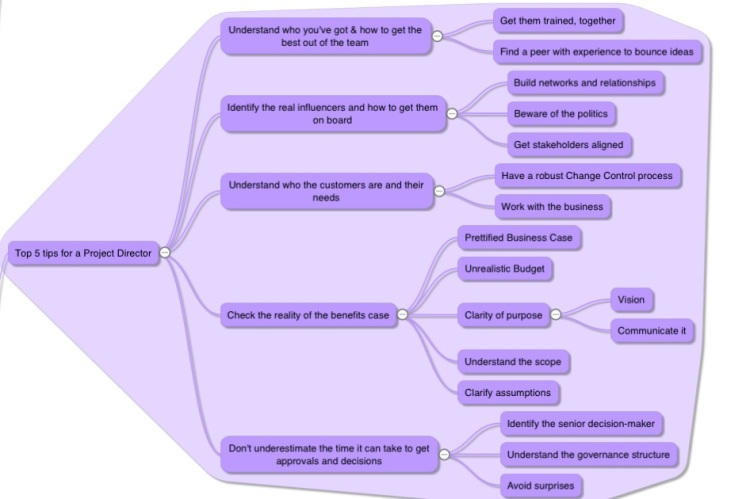This afternoon I attended one of the BBC Project Management Office’s regular Forum meetings and the theme was “Lessons Learnt“.
The initial discussion focussed on Lessons Learnt by those in the PM community and the tips they would offer to a newly appointed Project Director. The group I was with came up with the list in this graphic (part of my Mindmap of notes from the Forum):

The whole group’s discussions were neatly summed up in the PMO’s Top Ten Tips:
- Don’t re-invent the wheel
- Have a clear and robust business case
- Be realistic about benefits
- Get your team right
- Get the governance right
- Create change that lasts
- Communicate
- Save time by avoiding surprises
- Be clear about requirements and assumptions
- Work with the business, in the business, to transform the business
The BBC PMO has a searchable Lessons Learnt Database with more than 200 entries that can be searched by category and by project phase.
The main presentation of the afternoon was made by Mark Smith, Programme Manager in Knowledge & Learning, BBC Future Media. He spoke about the Lessons Learnt from the BBC’s Olympics 2012 digital coverage. Mark has written an excellent blog post here. Today, he talked about three key areas where lessons were learnt:
- Scope – define the minimum viable product and deliver that as soon as possible
- Manage dependencies and their associated decision checkpoints (and have a Plan B!)
- Testing – test all the products as fully as possible, in an end-to-end environment
As the afternoon went on it was interesting to see how much the discussion was actually about Knowledge Management (KM), rather than Project Management. Mark described how individual teams held end of Sprint retrospectives so that learning was built-in routinely to all project work. Project Managers carried out end of project reviews and also used surveys to capture feedback from people. Finally, at the Programme level, the Leadership team conducted a facilitated workshop to home in on lessons to apply more widely. All of this struck me as being good examples of Knowledge Management in practice.
I’ve written several articles about KM including KM – applied common sense and KM in the project lifecycle so the afternoon’s discussions were reassuring because it was clear that the BBC approach was ensuring KM was embedded and not a bolt-on. Nobody was talking about “doing KM”, which was fine by me; all they were talking about was how to improve the way they run projects for the benefit of the organisation (and therefore the Licence Fee payer).
I’ve also written about the four key roles of a PMO. Two of these are:
- enable the organisation to build its capability to run successful projects and programmes
- continuously improve the way the organisation runs projects and programmes
It seems to me that this afternoon’s BBC PMO Forum clearly ticked both those boxes.









Discussion
Comments are closed.